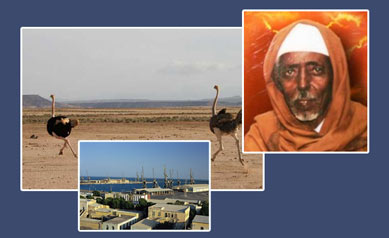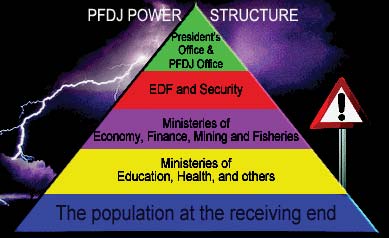Divorce Isn’t An Option, Ethnic Grievances Isn’t A Sin Either
 As the saying goes two birds with one stone, this edition of “tebeges” will attempt to respond for two different issues at the same time. In the past week I read two articles that propelled me to write this essay. Indeed, I discovered something unpleasant thing that gave me rude awakening against all my feelings and my hopes. I felt as if I am transported from a harmonious tune of political principle to aberrant sounds of political Cacophony. I started to talk to myself and the first utterance I made was “ala Eritrean politics.” And continue to raise my voice by saying, wow, this pull and push activities will never have an ending.
As the saying goes two birds with one stone, this edition of “tebeges” will attempt to respond for two different issues at the same time. In the past week I read two articles that propelled me to write this essay. Indeed, I discovered something unpleasant thing that gave me rude awakening against all my feelings and my hopes. I felt as if I am transported from a harmonious tune of political principle to aberrant sounds of political Cacophony. I started to talk to myself and the first utterance I made was “ala Eritrean politics.” And continue to raise my voice by saying, wow, this pull and push activities will never have an ending.
Understandably, the unusual self-reaction drove my family members to my reading and writing room where I sat, and asked me what happen? My answer was what it could be other than the stupid and dirty Eritrean politics. I told them never mind, I have an oath to my people when I joined the army struggle. It was a sober oath out of instinct that I will never stop the struggle for “justice and democracy” and hence it will remain to be the struggle of my life and the signature of my politics.
Back to the story line, my friend Saleh (Gadi) Johar wrote a disturbing remark in the edition of his “Negarit” which calls a divorce within the political organizations. I understand his frustration. Who doesn’t by the way? But, I will say to Saleh this, keep the belt tight and never abandon the lofty banner of reconciliation of awate.com. Lofty ideals have never been at hand because the interest and resistance of the opposite side is so armed, brutal, and difficulty to overcome.
Look the lofty ideals of Obama and the resistance of the interest groups in alliance with the clueless Tea party and Grand-Pa Republican Party against his ideals. The mumbo-jumbo accusations of his religion and citizenship, neo-Nazi and socialism baseless distorted attacks all propagated and aimed to stick to the public mind. Did I hear and get a call to be informed that someone is not an Eritrean? Hell I did. This shows how difficulty it is to bring change in any social stratification where all are fighting for their interests by blackmailing their opponents. We may call it “a conflict of interests” as I may try to elaborate it later in this essay.
History reminds us that divorce in Eritrean politics is blood shade. Not to far from our recent memory. A lot of innocent souls are paid in the past for every political divorce and separation. Here again, from our debate we see the signs and symptoms which are indicative that they are still prone and privy seal to this precipitous discourse. They don’t understand how different entities live in the same space in a peaceful coexistence. They understood the life of Ocean animals where the big fish hunt young fish for self-preservation and to sustain life. The histories of Eritrean political organizations as always are predicated on “destroy and dominate” whether it is in politics or war. That is why I refuse any divorce and separation within the umbrella of EDA. But if EPDP stuck with its gun and keep boycotting every process, then eventually by virtue of their refusal are technically out from EDA. The choice we are remained with is to keep the rest of EDA intact.
Saleh, remember and visualize that you gave a big smile to the boycotters and above all to the regime. You gave them ammunition to ride their horse, slum the process and the task of the commission; and yes ridicule the public discourse where we saw the glimmer of hope. When the public start to own their destinations with the organizations who voluntarily outsourced power to the real Eritrean people, I can’t imagine smart individuals like Saleh, who gave so much to the lofty idea of “unity and reconciliation”, year in and year out for more than a decade, will come with this disturbing idea of “divorce.” May be, we need to asked Saleh what will be next after divorce? The public owes you more details on the divorce and the goal aftermath of the divorce.
Ethno-Religious Grievances is Reality, Don’t Ridicule it
My second concern is on an article posted at EPDP’s organizational website that puts ethnic grievances and EPFDJ’s narcissistic action on the same pedestal as evils. The article was written by Gebre Gebremariam under the title “What if the two evils cooperate: Dictatorship, ethno-religious politics and lose of Eritrean identity.” Unlike the third tier of EPDP’s writers who need adult supervision to protect their image, Gebre made some substantive argument worthy of rebutting. He made it substantive in a way he added some flavor of theory and philosophical ideology. The question is can Gebres’ argument pass the litmus test.
I will argue that Gabre has failed to pass the litmus test, and here are the elements that account to the shortcoming of his argument: (a) Gebre added adjectives to his argument (such as lunatic) to insult to those who are on the opposite side of his argument. Not good, soar grapes can’t be swallowed by the public let alone test the validity of his argument. (b) Other than unwarranted accusation that pervades engagement, his essay doesn’t offer solution to the subject nor does it mimic public debate (c) Instead suggesting remedies for all the troubles we are facing, he opted to play as peace-depriving role by a purely runaway assumptions (d) He equates ethnic grievances with terror abetting dictator. This shows that he hasn’t a practical personal knowledge and acquaintance with our diversity. Gebre has to be mingled for certain years with the other section of our diversity to extract him self from this persistent self-denial and convoluted reasoning. If I am allowed to do empirical deductions “evil” as a cause and “sin” as effect, then Gebre will not have an inkling to say ethno-religious grievances is a sin. Whether he is accusing them with spiritual sin or political sin, I will leave for the public to sort it out his inadequate and contrarian position to the multi-ethnic identity of our mosaic. But, when did ethnic grievances become evil? When did group and individual identity become ridiculed?
Needless to say, the shared identity “Eritrean identity” could not and should not override the identity that makes you who you are as individual and as group. Unlike the individual and group identity, the shared identity can only be validated by the free will of the various groups (ethnics) as units of the bigger identity who decided to live and coexist in mutual respect. What Gebre had missed the point in his argument is that, by attacking the ethnics, he inadvertently is hurting the shared Eritrean-identity. Eritrean identity is not “resistance-proof” unless you take the necessary precautions to preserve the bonds that hold us together.
It has been clear so far that the new Eritrean identity that exists today has posed the greatest threat to the integrity and viability of various ethnic identities. This is precisely the reason why many ethnics opted to preserve their identities before any kind of shared-identity. Therefore Gebre’s stick-diplomacy with convoluted reason for hate will not help to the overblown desire of shared identity.
However, Gebre aptly made a valid historical argument how our shared-identity is evolved and consolidated in a precise way. I concur and I said amen. But, If the good doctor, Dr.Mohamed Khier allows me to use the word “but” or “gnna,” the word that made him uncomfortable in the conference, just for this time (I am kidding), there is always “but” when something is incomplete and insufficiency to show the shortcoming of the premises, arguments, and hypothesis when they are tested or applied. Certainly the utterance of “but” does not hinder from going forward just to remind the good doctor.
Now “but” Gebre failed to say something why this ethnics are acting in the way they are. If he would have posed questions pertinent to their grievances and their quest for justice before he writes his essay, I believe he would have different approach to the issue. But who knows, if Gebre is advocating for his ethnic interest as politics is the game of maneuvering to maximize your interest. Aha, I don’t forget that. By the way there is nothing wrong to maximize your interest as far as you don’t undermine the interest of others; a lesson to be learned.
Something which worries me still is that the kind of Gebre’s essays always hits the emotions of human mind and agitates fears and uncertainty to the social group he supposedly intended to convey the message… indeed to make them like the blind man feeling the elephant. He added fuel to the conflict which is already out of control. What I am trying here is to make sure that Gebre learn and grow from these dire mistakes that have enormous consequences.
Conflict Theory, Protracted Conflicts
When one argues, the text, purpose, and the intent must show the same direction. Otherwise he or she can’t make relevant, credible, and persuasive argument. Gebre attempted to walk in a dangerous terrain of culture politics in a political shape shifting to send subliminal message. Because of his retro-old- idea approach, the text of his essay conflicted possibly with the purpose and intent that might have been in his mind. Never mind he preferred categorical approach which is descriptively inaccurate. Such approach definitely adds a toxic brew of distrust and suspicions to the psychological fears of insecurity looming within our minorities.
To avoid from the pitfalls of Gebre’s argument, let me make some theoretical background to clear the air. In the most general terms we see conflicts as a collision between interest groups and their projects. Conflict occur when the project of the actors start impinging on each other. Conflicts which involve a core sense of identity between or among ethnics tend to be intractable. The intractability is generated by the dynamics of the conflict rather by a rational reasoning process. Hence conflict resolution here means changing the conditions of intractability, with an apprehension that such conflicts are not single-issue disputes but multiple conflicts being waged simultaneously.
How relevant are these theoretical hypothesis to the protracted conflict we are now experiencing in the Eritrean political dynamics? I will argue that each description of relationships and conflicts of interest group of our diversity falls within the theoretical explanations alluded above. In our case, the cause of the conflict is the regime in Asmara. EPFDJ is impinging on the interest of the minorities and are attacking the core sense of their identities. Indeed the dynamics that generated from the action of the regime has metastasized to the opposition camps in the Diaspora. Hence it becomes the subject of our debate. Therefore, where there is no collective understanding on the action of the regime and the majority becomes complacent to recognize the grievances of our minorities, they don’t have an option but to organize in a way to defend their interests by searching way of political bargaining. This is an elementary politics that every one of us needs to comprehend.
This writer however believes on the premordialist approach of ethnic bargaining. Premordialist approach on ethnic bargaining is stressed on the natural differences among various distinct-group identities and the problem of formulating compromise solutions (Connor 1994:153). The empirical reasoning that lead me to believe on this approach are simple and they are (a) the socioeconomic development of our society (b) the socioeconomic relations within our diversities (c) the depth of mistrust among our diversities.
From a clinical politico-psychology that deals with the sciences of context, of intervention, of change, and of living together, we can learn the ability to identify and analyze the obstacles involved in living together. The idea of achieving transformation of the status quo and the power to identify and analyze the obstacles in living together; including the identification what inhabits dialogue between subjects and groups; or in short to identify all that threatens in living together was debated by Robert De Carli in a great deal (Carli,1987,1996, 2006).
The purpose of touching this area of expertise in this essay is simple and that is to show, that there is also other perspectives to be considered as a paradigm of intervention in the way we approach the conflicts within our diversity. For those of us who want to do empirical studies, regarding our diversity, the subject of politico-psychology will be of great help as an additional vector to our approach to find solutions.
Conclusion
I love the rare instinct of human behavior to fight the obstacles of nature and to fight against the resistance of change and nay Sayers. When I saw these few days “a rescue capsule” descending down and ascending up to pull the Chilean trapped miners, from deep half mile underground through an artificial hole, it makes me appreciate the endless creativity and endeavor of human being to conquer the obstacles of nature against all odds. When I saw the British Prime minister Cameron and the Australian Prime minister Gillard to form a coalition government when they can’t win the majority seats to form their own government, it teaches us governing is not one way highway. We learn that at any turn there is always a road to move on to face the challenge.
On the other hand, my call to EPDP was with due caution and awareness, with all the destructive parts of affects and bonds, with respect and hope to join the commission, and above all with no judgmental or guilt-inducing attitudes. Albeit, their writers need adult supervision to protect the image of the organization, and probably need to send them to a workshop learning of clinical politics to control their emotions and affectivity to deal constructively with bond and relationships with their own world and others.
When the hiatus of public mood ends, it depresses the chaos within the political organization and certainly feels compelled to call curbs against the menace of EPDP to shield the commission. People’s movement is not far-reaching reality and diversionists will not stop it from happening. The strong desire to get even more involved in the direct Eritrean politics is echoing throughout the world. Hence the commission must stick with its mandate given from the legitimate conference.
Comment: Tebeges@yahoo.com



Awate Forum